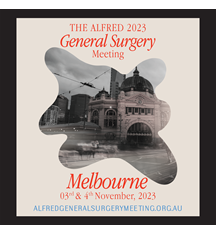2023 | Volume 24 | Issue 4

Dr Iain Skinner is a colorectal surgeon at Werribee Mercy Hospital, Melbourne, where he also serves as the Director of Surgery and is currently the acting clinical services Director of perioperative services.
Dr Skinner had wanted to pursue a career in surgery since the age of four.
“I don't remember this, but my mother tells me that I said I wanted to be a doctor who ‘cut up people's tummies’,” he says. “The only thing I ever wanted to do through my entire schooling was to be a doctor.”
However, Dr Skinner hit a road bump in his ambition when he just failed to get the required marks for medicine. He was forced to retake his Higher Secondary Certificate (HSC) exam and psychologically mature a little more with the extra year at school.
He was accepted into medicine at the University of Melbourne in 1983. And it was during his time living at Queens College under the tutelage of Dr Peter Little, the college surgical tutor, that he discovered the “excitement” of colonic surgery.
“We used to go out and assist Dr Peter Little at a smaller private hospital in Reservoir where he would do some amazing cases. He was a gifted general surgeon and when he taught us about bowel surgery it just resonated,” he says.
After initial residency training at Royal Melbourne Hospital (RMH), a year as an anatomy demonstrator at Melbourne University, and a year as a surgical Senior House Officer (SHO) at the Royal Devon and Exeter Hospital in the UK, Dr Skinner returned to RMH and gained entry to surgical training. He was admitted to Fellowship of the College in February 1999.
Dr Skinner, who is originally from the UK and emigrated to Australia with his family in 1970, returned to his country of birth to undertake his post-fellowship training in Canterbury in Kent (General Surgery) and then in Hull in East Yorkshire (colorectal). He returned to Australia in 2001 taking up consultant posts at Western Hospital, Footscray and Werribee Mercy Hospital, and basing his private practice in Werribee.
In the same year he was co-opted to the Basics Skills Committee (BSC) at the Royal Australasian College of Surgeons (RACS) and was appointed as chair in 2002. During his time as chair Dr Skinner led the development and production of a new surgical skills course designed specifically for Australian Trainee surgeons. He also wrote a short textbook on surgical skills while in the UK, called the Basic Surgical Skills Manual, that was published by McGraw Hill. RACS acquired this text and the Australasian Surgical Skills Education and Training (ASSET) committee modified and expanded this text, which is now called the Fundamental Skills for Surgery and accompanies the College’s ASSET course.
“While we initially provided the British Basic Surgical Skills course under licence this had some deficits and didn’t meet the needs of our [Australian] Trainees,” he says.
In 2006 he moved on from his role as chair of the BSC and increased his operating hours, both privately and publicly.
“I was working 11 or 12 and a half days a week, operating Saturdays and Sundays, at Western to manage the cancer load I had from my practice in Werribee,” he says.
Dr Skinner is also involved in national colonoscopy governance and is a member of the current college Surgical Gastrointestinal Endoscopy Committee (SGEC).
He first began understanding the risks of colonoscopy in 2011 after discovering gaps in his own knowledge when writing some medical legal opinions on the subject.
“I was actually called the ‘Grim Reaper’ by one of my colleagues when I presented a talk about the medico-legal risks of colonoscopy in 2014,” he says.
Dr Skinner also became one of RACS representatives on the Conjoint Committee for the Recognition of Training and Gastrointestinal Endoscopy (CCRTGE)—the body that accredits the training of endoscopy in Australia—the Conjoint Committee for Colonoscopy Recertification (CCCR), the new combined endoscopy training curriculum committee with Dr Ben Devereaux from Gastroenterological Society of Australia (GESA), has chaired the Colonoscopy Clinical Care Standard Committee for Australian Commission On Safety and Quality in Health Care (ACSQHC), and is part of the new RACS Reskilling in Endoscopic Skills and Training program.
The now 59-year-old reflects on “wearing multiple hats” in his career and the sacrifices he made.
“I look back at some of the things that I would have liked to have done in retrospect. And I think, why didn't I do those things?” he says.
“But then I look at what I've been able to achieve; the leadership I've been privileged to be allowed to provide; the education for Trainees and medical students; the support I've been able to give to colleagues; and the difference that this has made to the community and you think ‘how could I not?’”
Despite the rigorous workload of his surgery and academic work, Dr Skinner developed an “obsession” with fly fishing, and over the years has amassed a large collection of fly-fishing gear including thousands of flies, dozens of rods and reels, and hundreds of books.
“I love everything about it. It’s beautiful to hold a rod and feel the rhythm when you cast, to feel the movement of the river while you’re scanning and looking for fish,” he says.
Dr Skinner has gone on fishing trips to Aotearoa New Zealand, Europe, USA, the Seychelles and around Australia. He often fishes on the Goulburn River in northern Victoria where he has a second home. This month he is travelling to Kiribati a small island country in the Pacific to fly fish for bonefish and giant trevally.
Dr Skinner is married to a Geraldine, who runs his practice. They have two adult children.
He tells aspiring and young surgeons that surgery is “something that you have to commit to with both your head and your heart.”
“It doesn't matter what sort of surgery that you do. The most amazing thing that will ever happen to you is the number and variety of people you meet, and the experiences that you encounter because of the people you are involved with and how you are able to change their lives through your skills and care. Don’t ever doubt that through your individual efforts you can help change the world one step at a time!”


